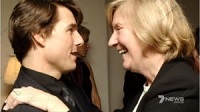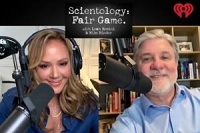
We noticed recently that one of the most important stories we published at the Village Voice is missing a series of audio recordings that go with it. They come from a secretly-recorded tape that captures then-Scientology spokesman Tommy Davis intimidating a church member with the threat of ‘disconnection,’ Scientology’s toxic control mechanism that Davis had publicly pretended didn’t exist in a famous CNN segment.
We also realized that we still had the original recordings from that story, and so we decided we would republish that 2011 story here at the Underground Bunker, with the recordings restored. We hope you’ll see why we consider this such important evidence about how Scientology actually operates. As for Davis, we are constantly asked about him. Please see this story about what he’s been up to since he left his job as Scientology’s mouthpiece. And even more about his work as spokesman now for billionaire Tom Barrack.
Tommy Davis, Scientology Spokesman, Secretly Recorded Discussing ‘Disconnection’
Originally published in the Village Voice, August 30, 2011
The Village Voice has obtained an audiotape secretly recorded in December 2009 at a meeting between Scientology spokesman Tommy Davis and a man named Shane Clark. The purpose of the meeting: Clark was facing the prospect of being declared a “suppressive person” by the Church of Scientology, carrying with it the prospect of Clark being “disconnected” by his entire family, who are all Scientologists.
Just a year earlier, in May, 2008, Davis had appeared on CNN and claimed that the policy of “disconnection” does not exist. But in the audiotape he speaks openly about it, saying at one point, “It is what works. It is what safeguards the church.”
Since that meeting, Clark, 30, has indeed been “declared” by the church, and his family — his parents, his brother and his sister — have all disconnected from him, cutting him out of their lives entirely.
Clark’s crime? He was employed by a man named Marc Headley, a former Scientologist who defected in 2005 and subsequently became an outspoken critic of the organization.
In the recording, Davis makes it plain that unless Clark quits his job and disassociates himself from Headley, he will be declared a suppressive person, or “SP.” According to church doctrine, Scientologists in good standing are not to communicate with people who have been declared SPs. To indicate the seriousness of the situation, at the beginning of the meeting, Davis announces that he is going to tape it. “I was going to record this, our conversation. I didn’t know if you were aware of it. For both of our benefit,” Davis can be heard to say.
What Davis was not aware of, however, was that Clark was also taping the meeting.
Clark’s recording of the meeting was made available to the Voice some time ago by Headley, Clark’s friend and now former employer. Since then, we have authenticated it, transcribed it, and turned a large portion of it into short movies so that our readers can view the words as Tommy Davis speaks them.
Last week, the Voice made numerous phone calls, left voice mail messages, and e-mailed Tommy Davis and the Scientology media desk seeking comment on this recording. We received no reply.
Tommy Davis was once a fairly ubiquitous face for Scientology, appearing on a CNN special series about Scientology last year, and also on widely seen programs in the UK and Australia. The son of Scientologist actress Anne Archer, Davis rose to become Scientology’s chief spokesman following the defection of his predecessor, Mike Rinder, in 2007. In 2008, he appeared on CNN’s morning show and was interviewed by anchor John Roberts. In the segment, Roberts asks Davis about the policy of disconnection, which critics of Scientology complain about:
“They claim that the church separates family members and there is this practice of ‘disconnection,’ where if you’re a member of the Church of Scientology…and someone in your family, or a friend, or your spouse is skeptical or critical of the Church of Scientology you are supposed to disconnect yourself from that person,” Roberts says.
Davis replies: “Well, first of all, this is a perfect example of how the Internet turns things and twists things. There’s no such thing as disconnection as you’re characterizing it…There isn’t any such policy in the church that’s dictating who people should or should not be in communication with. It just doesn’t happen.”
Davis was just repeating what church officials have said publicly for years, that L. Ron Hubbard’s 1960s-era policy of disconnection was abandoned long ago. Davis was refuted, however, by director Paul Haggis, who had seen the spokesman’s appearance on CNN: “We all know this policy exists,” Haggis wrote to Davis in a 2009 letter announcing that he was leaving Scientology. “I didn’t even have to look any further than my own home. You might recall that my wife was ordered to disconnect from her own parents … although it caused her terrible personal pain, my wife broke off all contact with them.”
Davis, who was so prominent from 2007 to 2010, seems to have all but vanished in the last year. He has made no recent television appearences. Daniel Miller, a writer for The Hollywood Reporter, says that he communicated by e-mail with Davis between April and June of this year for a story. But otherwise, Davis has not been heard from. Former Scientologists speculate that he is at “Int,” the organization’s secretive desert headquarters, serving some kind of punishment by church leader David Miscavige.

In December 2009, however, he was still an important, public member of Scientology’s highest executive ranks when he met with Shane Clark at a building in Los Angeles. Davis arrived at the meeting with Jessica Feshbach, who is his wife and media relations colleague.
Feshbach is best known for her role as the Scientology handler for Katie Holmes, who was introduced to the church by her husband, Tom Cruise. Feshbach is often seen with Holmes, and they are said to be very close friends.
Shane Clark arrived to the meeting with his girlfriend, Ranna, who was a Scientologist. Clark was 29 at the time and no longer considered himself a practicing Scientologist after having worked for the church, but everyone else in his family were enthusiastic members. His parents had split up years before, but his father was still an active member, as was his sister, both of whom Clark saw often. His mother and brother are hardcore Sea Org members, who are required to sign billion-year contracts and promise to come back, lifetime after lifetime, to serve Scientology with abject devotion. Each were so dedicated, Clark had not seen his brother in nine years, and his mother only one time in that same nine year period, two years earlier.
And now, Clark knew he might be in some trouble with the church. For some time, he had been working for Marc Headley, a man who escaped from Scientology in 2005 and subsequently wrote a book about his experiences, Blown for Good. As we have written earlier, Headley’s access to damaging information, in particular regarding church leader David Miscavige, made him a major concern to the organization. Headley had denounced the church in Germany, where the government has considered banning Scientology, and his media production business had become a kind of haven for other former members who needed to find employment outside the church. Headley and his wife, Claire, had also filed lawsuits against Scientology, claiming that they were owed money for being forced to work at sub-minimum wage for so many years while they were Sea Org members. (Sea Org members typically take home 40 to 50 dollars for a week that could reach 100 hours or more of work.) Those lawsuits were dismissed last year.
As you’ll hear in the recordings, Clark explains that although his employer, Headley, is an outspoken critic of the church, Clark himself has not criticized the church publicly, even though he has some issues with its policies. In fact, to this day, Clark tells the Voice that he “bears no ill will to Scientologists” and told me he believes “most Scientologists are good people trying to help.” But in the meeting, it was quite clear what the stakes were: if Clark didn’t leave his job working for Headley, he would be declared a suppressive person, with the implication that his active Scientology family would disconnect from him.
“My being employed with Marc, my being associated with Marc was putting me in a position, in their mind, that they would protect other people by declaring me,” Clark told the Voice last week in a telephone interview. “Oh, that was absolutely understood. My being declared meant that my family would have to disconnect from me. That was the point of the meeting.”
In this first segment, introductions have already been made, and Davis has announced that he’s taping the meeting. Now, note how Davis immediately brings up Clark’s family as he begins to describe the situation that Clark is in. And then Davis makes a pretty surprising analogy, as you will see.
Davis has now established that, from the church’s perspective, Headley is akin to a neo-Nazi, and Clark is a kind of collaborator. (Davis will come back to this theme a few more times.)
In the next portion of the recording, Davis quotes at length from an L. Ron Hubbard policy in regards to declaring someone a suppressive person. In particular — and a part of the policy that Davis will repeat several times during the meeting — is the notion that even if a person is not himself criticizing or harming the church, but is associating with someone who is, that in itself is grounds for being declared a suppressive person.
Then, in this next segment we’ve put into a movie, Davis explains why such a policy is needed, to protect the people who devote so much time and effort to the church. While making that point, Davis provides his justification for why Sea Org members live such austere (some would say abusive) lives.
As you’ll see in the next segment, which occurs a few moments later, Clark does something remarkable — he sticks up for himself. At several points during the meeting, in fact, Clark defends his actions and even questions Scientology’s policies in remarkable moments of backbone. Remember, Clark is in a fairly intimidating position — if the church declares him, he knows that his family is made up of people who take Scientology policy seriously enough that he may never see them again.
(There at the end, Ranna assumes that Davis is in the Office of Special Affairs — Scientology’s intelligence and covert operations wing, which also oversees the organization’s public relations. But as chief spokesman, Davis is under a different branch of Scientology’s alphabet soup structure.)
In this next segment, you’ll see that Davis explains that he’s not interested in debates about the church or its policies — and then he provides a rapid-fire description of how massively Scientology is expanding (a constant refrain from Scientology officials which has repeatedly been debunked).
Davis then suggests that critics like Headley are only motivated by greed.
Davis’s final statement there has a few eyebrow-raising elements to it. First, he tries to sound somewhat noble, saying that it would be “criminal” for Scientology to take money from people who could not benefit from its services, and does not do that. But we are reminded of the notorious case of Raul Lopez, where a brain-damaged man who hardly had the capacity to decide things for himself was bled dry by Scientology, which got its hooks into the $1.7 million he had received after injuries sustained in a car accident.
And again, we’re starting to hear Davis repeatedly ask about what Clark’s “values” are. Clark, in other words, has to decide whether he really cares about his own family — because it is he, not the church, who is forcing the potential disconnection.
In the next portion of the recording, there is some discussion of the Marc Headley case, and his accusations about violence at Int base, which Shane says he saw with his own eyes when he worked there himself.
Davis steps in, however, saying that it isn’t appropriate to discuss what happened at the base in front of Clark’s girlfriend, who has not been there.
Instead, Davis wants to bring the focus back on Clark and his family, and now, in this next segment, you’ll see that he and Feshbach begin to build a case that if Clark hasn’t seen his family more, it’s his own fault.
In the next section of the recording, after Shane says that quitting his job is not really an option, Feshbach speaks up and says that it’s not just the job that is a problem, but Clark’s association with Headley.
“We’re talking about the bigger picture of the connection. If it really is that you need another job, I’ll help you find another job,” Feshbach says. “We do that all the time. Do you see what I mean?”
She goes on to say that the church has a duty to inform members of anything that could have a negative effect on the church. But Clark doesn’t like the idea that he’s being branded an enemy.
In the next segment, you will see that Clark boldly brings up the policy of disconnection itself and suggests that the church get rid of it, saying that nothing else causes the church more problems.
Davis then answers, you will hear, in skillful doublespeak: “Well, from the viewpoint of the people who are involved in being responsible for the breaking up of those families, I could see how you could have that viewpoint.”
There at the end, Davis suggests that there are policies by which a Suppressive Person can get back in the good graces of the church (the “A to E steps”), again putting the blame for disconnection on the SP and not on the church itself.
There’s some noise on the recording as Shane shifts in his seat, and then we go right into the next segment as Davis continues to explain that the blame for disconnection is on the wayward former member, not Scientology. In fact, Davis says, the idea that people are separated from their family by outside forces — and not their own fault — is “a bit of a lie.”
During that segment, Davis speaks most directly about disconnection, justifying it as a legacy of L. Ron Hubbard and group survival:
“Anyway, I think I’ve sort of said my piece. I’ve read you the key policies, I’ve read you the one in terms of organizational suppressive acts…LRH puts it in historical precedence as it relates to groups, period, not just to Scientology. There’s a reason groups do this, it’s integral to their survival. Groups who don’t do it get destroyed. And it’s just been proven over and over and over again in Scientology’s 58-year history…to whatever degree SP’s scream about how horrible it is, bottom line, it is what works, it is what safeguards the church. And by virtue of the fact that people who are connected to suppressives do rollercoaster, cannot make gains, and are called potential sources of trouble, or sources of trouble for a reason, based on historical precedence, it isn’t a policy that’s going to change tomorrow, next week, next month, or ever.”
The next segment immediately follows the last. Davis is starting to sound a little more forceful now. Clark’s repeated objections about the nature of disconnection policy seem to be getting to him…
That last part by Davis bears repeating: “You’re either the most stubborn, obstinate SOB I’ve ever met, or you have a two-digit IQ. I don’t know how else to spell it out for you, man. I really, really don’t. OK? You know, go pull out some law books, call an attorney: litigation is unpleasant. It really is. It just really is. And if you can’t, and I’m not even making a threat. I’m not.”
Not a legal threat? Well, if Tommy says so.
In the full recording, he then goes into a long description of the background of the Headley lawsuits. But then he waves them aside: “Let’s take the whole lawsuit out of it, completely,” he says. He then boasts that he’s actually trying to put people together, not disconnect them.
“Believe me, I have put far more families back into communication than Marc,” Davis says.
Ultimately, Davis says, It’s Clark who is in violation of policy, and the next move is his choice. And as you’ll see in this next segment, Tommy will take the Nazi metaphor in a surprising new direction.
It’s now clear that they are at an impasse. “I’ve said what I think, and you guys obviously think I’m nuts,” Shane says on the recording. His girlfriend, Ranna, now simply walks out.
Davis then seems to try to impress Clark again with how well the church is doing. He puts on a short video extolling the virtues of a new Scientology resort in Florida where church members will be able to rocket up “the bridge” to spiritual advancement.
But Shane reminds him that he’s not really a practicing Scientologist anymore.
“I don’t believe what most Scientologists believe,” he says.
“That’s your call,” Davis replies.
“I would prefer not to get declared. That would be an issue probably with my sister, and probably my dad. At the same time I do need the job,” Shane says.
And then, the final segment that we’ve put into a movie…
On the recording, we then hear Shane zip up a bag and then leave for his car. As he drives away, he calls Ranna and they talk about the meeting.
“In their eyes, it’s ‘my way or the highway.’ No compromise. I have to stop working for Marc, or that’s it,” Shane says.
Shane didn’t quit his job. Several months after the meeting, Clark learned that he had been declared a suppressive person by the church. His family immediately cut all ties to him.
“My dad was talking to me all the way until the point I was declared,” he told me last week. “I had been debating with him the stories about COB — David Miscavige — beating people up. He would have none of it.” (“COB” — Chairman of the Board — is one of ways Scientologists refer to Miscavige. “DM” is another.)
“We debated this for months before I got declared. Then I got declared and all of a sudden he wouldn’t talk to me,” Shane adds.
As we learned from the recording, he was already almost entirely cut off from his mother and brother, who are Sea Org members and too busy to do anything but work incredibly long hours for low pay (Headley, when he was at Int, says he worked more than 100 hours a week for a weekly salary of about $40.)
“They would argue that my mom and brother weren’t talking to me because they were too busy saving the planet, and I wasn’t on the same page with them. Which I understand. They wouldn’t be lying if they made that argument,” Clark says. “My mom is convinced that her mission is more important than her family.” He assumes she’s at the headquarters near Hemet, California, but he can’t be sure. He says he has no idea where his brother might be.
Clark is now declared, but the reason for it no longer exists: Headley is no longer his boss. Headley sold the company recently, but he points out that Shane’s new boss is also an SP. So he may not really be in a better situation.
I asked Clark how life is nearly two years after Tommy Davis told him he was the equivalent of a bartender serving drinks to concentration camp guards.
“I’m still in the same job. Living in a decent place. I have a new girlfriend. So things are good, actually. I have nothing the church can take away from me. There’s nothing more that they do,” he says.
But he adds that he would, at some point, like to see his family again.
——————–
“A psychiatrist tells you that people aren’t really insane, because insane people could snap out of it if they wanted to, and this, therefore, is their reason for punishing people who are insane. See, their logic just goes haywire halfway through. They almost have an answer and then they miss it. Almost touch it, miss it. Once in a blue moon some psychotic will — well, this is not even a technique — but some psychotic will suddenly get sane on this statement made to him: ‘You don’t have to be insane, you know.’ You know, he all of a sudden gets sane. It’s quite amusing. Much more often, psychotics turn sane on this one: ‘Come up to present time, please.’ They do and they say, ‘Hello!’ They’re not insane anymore; just pull them out of an engram.” — L. Ron Hubbard, January 24, 1957
——————–
“LOY AND CANDY: These two were doing all right until they came to Flag at which time their parents anti-Scn attitude keyed in and they became as cases ‘Troublesome Sources.’ They have been sent back at Flag expense to handle their parents and report to AOLA and complete their retrain at which time their Class VIII will be restored.” — The Commodore, January 24, 1970
——————–
“Dianetics doesn’t handle everything but it does handle a lot. It is absolutely amazing technology. The newer processes and the E meter make it even more amazing! As an auditor you will start to see how the tools work , very quickly experience past life events and start to see that engrams are very real and do create negative effects. I do wish LRH had included some of the newer processes in the book such as R3RA.”
——————–
2001: Mike Krotz reported that the body which washed up on a St. Petersburg beach belonged to a former Scientologist. “I have it on very good authority that this was the son of two area Scientologists. He was kicked out of the house some years ago, as he would not follow the teachings adhered to by his parents. They ‘disconnected’ from his ‘thetan infested meat body,’ and refused to have anything to do with him.” From the St. Petersburg Times: “The body was found about 5:20 p.m. on Redington Shores beach near 18200 Gulf Blvd. and authorities are trying to determine who it was. The body may have been in the water more than a week. It was a white man with no identification.”
——————–
“If you believe that the Church of Scientology is a criminal organization, that makes David Miscavige the most successful crime boss in the world.”
——————–
Full Court Press: What we’re watching at the Underground Bunker
Criminal prosecutions:
— Danny Masterson charged for raping three women: Masterson arraigned Jan 20. Next conf to set prelim, March 24.
— Jay and Jeff Spina, Medicare fraud: Jay’s sentencing delayed to March 2.
— Hanan and Rizza Islam and other family members, Medi-Cal fraud: Trial scheduled for May 20 in Los Angeles
Civil litigation:
— Luis and Rocio Garcia v. Scientology: Oral arguments were heard on July 30 at the Eleventh Circuit
— Valerie Haney v. Scientology: Forced to ‘religious arbitration.’ Petition for writ of mandate denied Oct 22 by Cal 2nd Appellate District. Petition for review by state supreme court denied Dec 11.
— Chrissie Bixler et al. v. Scientology and Danny Masterson: Dec 30, Judge Kleifield granted Scientology’s motions to compel arbitration. Jan 29: Status conference.
— Matt and Kathy Feschbach tax debt: Eleventh Circuit ruled on Sept 9 that Feshbachs can’t discharge IRS debt in bankruptcy. Dec 17: Feshbachs sign court judgment obliging them to pay entire $3.674 million tax debt, plus interest from Nov 19.
— Brian Statler Sr v. City of Inglewood: Second amended complaint filed, trial set for Nov 9, 2021.
Concluded litigation:
— Author Steve Cannane defamation trial: Trial concluded, Cannane victorious, awarded court costs.
— Dennis Nobbe, Medicare fraud, PPP loan fraud: Charged July 29. Bond revoked Sep 14. Nobbe dead, Sep 14.
— Jane Doe v. Scientology (in Miami): Jane Doe dismissed the lawsuit on May 15 after the Clearwater Police dropped their criminal investigation of her allegations.
——————–
 SCIENTOLOGY BLACK OPS: Tom Cruise and dirty tricks
SCIENTOLOGY BLACK OPS: Tom Cruise and dirty tricks
The Australian Seven News network cancelled a 10-part investigation of Scientology and its history of dirty tricks. Read the transcripts of the episodes and judge for yourself why Tom Cruise and Tommy Davis might not have wanted viewers to see this hard-hitting series by journalist Bryan Seymour.
After the success of their double-Emmy-winning, three-season A&E series ‘Scientology and the Aftermath,’ Leah Remini and Mike Rinder continue the conversation on their podcast, ‘Scientology: Fair Game.’ We’ve created a landing page where you can hear all of the episodes so far.
 LEAH REMINI: SCIENTOLOGY AND THE AFTERMATH
LEAH REMINI: SCIENTOLOGY AND THE AFTERMATH
An episode-by-episode guide to Leah Remini’s three-season, double-Emmy winning series that changed everything for Scientology watching. Originally aired from 2016 to 2019 on the A&E network, and now on Netflix.
 SCIENTOLOGY’S CELEBRITIES, from A to Z
SCIENTOLOGY’S CELEBRITIES, from A to Z
Find your favorite Hubbardite celeb at this index page — or suggest someone to add to the list!
Other links: Scientology’s Ideal Orgs, from one end of the planet to the other. Scientology’s sneaky front groups, spreading the good news about L. Ron Hubbard while pretending to benefit society. Scientology Lit: Books reviewed or excerpted in a weekly series. How many have you read?
——————–
THE WHOLE TRACK
[ONE year ago] Game over? Scientology claims it’s already won arbitration motion against Valerie Haney
[TWO years ago] Thirty-three years later, Scientology founder L. Ron Hubbard is still surfing the galaxy
[THREE years ago] The Battle of Portland: How Scientology turned a nightmare court verdict into a major victory
[FOUR years ago] Another Leah, inspired by her namesake, comes forward with a harrowing Scientology escape
[FIVE years ago] On the 30th anniversary of L. Ron Hubbard’s galaxial soul ejection, an obit by an old friend
[SIX years ago] First time in full: 1997 interview of Barbara Klowden, L. Ron Hubbard’s PR agent and lover
[SEVEN years ago] Scientology wins damages from French court, but it’s not the victory they were hoping for
[EIGHT years ago] Lawrence Wright: “Scientology Is Heading for a Reckoning”
[NINE years ago] Scientology: L. Ron Hubbard Still Surfing the Galaxy
——————–
Bernie Headley (1952-2019) did not see his daughter Stephanie in his final 5,667 days.
Valerie Haney has not seen her mother Lynne in 2,191 days.
Katrina Reyes has not seen her mother Yelena in 2,695 days
Sylvia Wagner DeWall has not seen her brother Randy in 2,215 days.
Brian Sheen has not seen his grandson Leo in 1,235 days.
Geoff Levin has not seen his son Collin and daughter Savannah in 1,126 days.
Christie Collbran has not seen her mother Liz King in 4,433 days.
Clarissa Adams has not seen her parents Walter and Irmin Huber in 2,301 days.
Carol Nyburg has not seen her daughter Nancy in 3,075 days.
Jamie Sorrentini Lugli has not seen her father Irving in 3,879 days.
Quailynn McDaniel has not seen her brother Sean in 3,195 days.
Dylan Gill has not seen his father Russell in 11,761 days.
Melissa Paris has not seen her father Jean-Francois in 7,680 days.
Valeska Paris has not seen her brother Raphael in 3,848 days.
Mirriam Francis has not seen her brother Ben in 3,429 days.
Claudio and Renata Lugli have not seen their son Flavio in 3,690 days.
Sara Goldberg has not seen her daughter Ashley in 2,728 days.
Lori Hodgson has not seen her son Jeremy and daughter Jessica in 2,441 days.
Marie Bilheimer has not seen her mother June in 1,966 days.
Julian Wain has not seen his brother Joseph or mother Susan in 321 days.
Charley Updegrove has not seen his son Toby in 1,496 days.
Joe Reaiche has not seen his daughter Alanna Masterson in 6,047 days
Derek Bloch has not seen his father Darren in 3,196 days.
Cindy Plahuta has not seen her daughter Kara in 3,516 days.
Roger Weller has not seen his daughter Alyssa in 8,371 days.
Claire Headley has not seen her mother Gen in 3,490 days.
Ramana Dienes-Browning has not seen her mother Jancis in 1,846 days.
Mike Rinder has not seen his son Benjamin and daughter Taryn in 6,149 days.
Brian Sheen has not seen his daughter Spring in 2,255 days.
Skip Young has not seen his daughters Megan and Alexis in 2,657 days.
Mary Kahn has not seen her son Sammy in 2,529 days.
Lois Reisdorf has not seen her son Craig in 2,112 days.
Phil and Willie Jones have not seen their son Mike and daughter Emily in 2,607 days.
Mary Jane Barry has not seen her daughter Samantha in 2,861 days.
Kate Bornstein has not seen her daughter Jessica in 13,970 days.
——————–
 Posted by Tony Ortega on January 24, 2021 at 07:00
Posted by Tony Ortega on January 24, 2021 at 07:00
E-mail tips to tonyo94 AT gmail DOT com or follow us on Twitter. We also post updates at our Facebook author page. After every new story we send out an alert to our e-mail list and our FB page.
Our new book with Paulette Cooper, Battlefield Scientology: Exposing L. Ron Hubbard’s dangerous ‘religion’ is now on sale at Amazon in paperback and Kindle formats. Our book about Paulette, The Unbreakable Miss Lovely: How the Church of Scientology tried to destroy Paulette Cooper, is on sale at Amazon in paperback, Kindle, and audiobook versions. We’ve posted photographs of Paulette and scenes from her life at a separate location. Reader Sookie put together a complete index. More information can also be found at the book’s dedicated page.
The Best of the Underground Bunker, 1995-2020 Just starting out here? We’ve picked out the most important stories we’ve covered here at the Underground Bunker (2012-2020), The Village Voice (2008-2012), New Times Los Angeles (1999-2002) and the Phoenix New Times (1995-1999)
Other links: BLOGGING DIANETICS: Reading Scientology’s founding text cover to cover | UP THE BRIDGE: Claire Headley and Bruce Hines train us as Scientologists | GETTING OUR ETHICS IN: Jefferson Hawkins explains Scientology’s system of justice | SCIENTOLOGY MYTHBUSTING: Historian Jon Atack discusses key Scientology concepts | Shelly Miscavige, 15 years gone | The Lisa McPherson story told in real time | The Cathriona White stories | The Leah Remini ‘Knowledge Reports’ | Hear audio of a Scientology excommunication | Scientology’s little day care of horrors | Whatever happened to Steve Fishman? | Felony charges for Scientology’s drug rehab scam | Why Scientology digs bomb-proof vaults in the desert | PZ Myers reads L. Ron Hubbard’s “A History of Man” | Scientology’s Master Spies | The mystery of the richest Scientologist and his wayward sons | Scientology’s shocking mistreatment of the mentally ill | The Underground Bunker’s Official Theme Song | The Underground Bunker FAQ
Watch our short videos that explain Scientology’s controversies in three minutes or less…
Check your whale level at our dedicated page for status updates, or join us at the Underground Bunker’s Facebook discussion group for more frivolity.

Our non-Scientology stories: Robert Burnham Jr., the man who inscribed the universe | Notorious alt-right inspiration Kevin MacDonald and his theories about Jewish DNA | The selling of the “Phoenix Lights” | Astronomer Harlow Shapley‘s FBI file | Sex, spies, and local TV news | Battling Babe-Hounds: Ross Jeffries v. R. Don Steele








